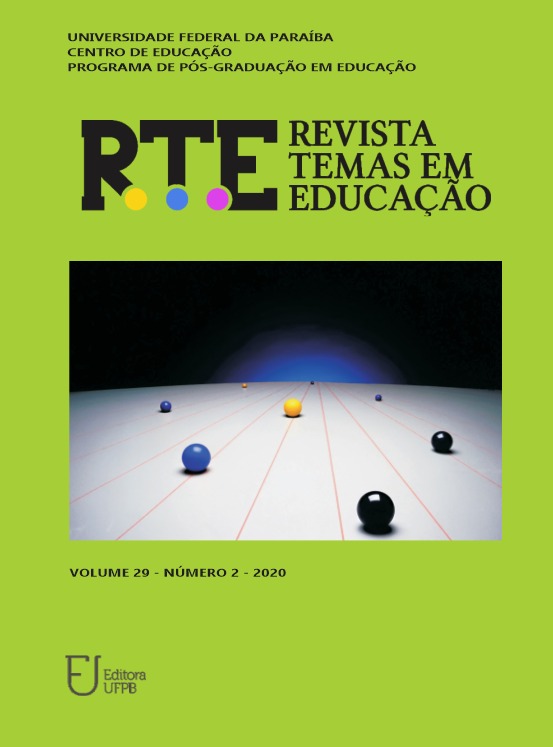HOLDING BY ESTÔMAGO: FOOD, EROTICISM, PRISON, POWER AND KNOWLEDGE
HOLDING BY ESTÔMAGO: FOOD, EROTICISM, PRISON, POWER AND KNOWLEDGE
DOI:
https://doi.org/10.22478/ufpb.2359-7003.2020v29n2.51819Keywords:
Brazilian cinema, Knowledge, Power, Prison, FoodAbstract
The article results from analysis of a cinematographic work that adresses, among other hard aspects o four society, poverty, the work exploitation, the waste of human potencial and its relationship with the prisioners conditions in Brazil. Through the methodology of Film Analysis (PENAFRIA, 2020; VANOYE, 2006) the work describes, contextualizes and interprets the film Estômago (2007). This comedy is about the twists and turns of the northeastern migrant Raimundo Nonato, who changes his way of being and living by learning the gastronomy secrets in São Paulo. In addition to reflecting on the knowledge/power relationship and the identity processes of people imprisoned nowadays, in the theoretical perspectives of Michel Foucault (1989; 2009) and Erving Goffman (1974), the article also highlights the creative use of filmic resources and the instigating denial of Manichaeism in adressing the complex themes present in the work.
Keywords: brazilian cinema; knowledge; power, prison; food
Downloads
References
AZEVEDO, Elayne; PELED, Shay. Comida e visualidade. Visualidades, 14(2), (2017). Disponível em: https://doi.org/10.5216/vis.v14i2.40053. Acesso em 10/01/2020. Acesso em:08/02/2020
BRITO, et al. Cinema e Alimentação: a cozinha no filme Chocolate, de Lasse Hallström. Demetra; 2015; 10(1); 27-42. Disponível em: www.e-publicacoes.uerj.br › index.php › demetra › article › download. Acesso em 08/02/2020.
CAMMAROSANO, Elenice Maria Onofre; JULIÃO, Elionaldo Fernandes. A Educação na Prisão como Política Pública: entre desafios e tarefas. Educação & Realidade, Porto Alegre, v. 38, n. 1, p. 51-69, jan./mar. 2013. Disponível em: http://www.ufrgs.br/edurealidade. Acesso em 06/01/2020.
DAMATTA, Roberto. Sobre comida e mulheres. In: O que faz o brasil, Brasil? Rio de Janeiro: Rocco, 1986. p. 41-55.
EWALD FILHO, Rubens; LEBERT, Nilu. Cinema vai à mesa: histórias e receitas. São Paulo: Melhoramentos, 2007, p. 191.
FIGUEIREDO, Eurídice. Prazeres da mesa, prazeres do corpo: Jorge Amado, culinária e erotismo », Amerika [En ligne], 10 | 2014, mis en ligne le 22 juin 2014, consulté le 30 janvier 2020. URL: http://journals.openedition.org/amerika/4881; DOI: 10.4000/amerika.4881. Acesso em 13/12/2019.
FOUCAULT, Michel. Microfísica do Poder. 8 ed. Rio de Janeiro: Graal, 1989, p. 270.
FOUCAULT, Michel. Vigiar e Punir: Nascimento da Prisão. Lisboa: Edições 70, 2013, p. 224
GOLDENBERG, M. Cultura e gastro-anomia: psicopatologia da alimentação cotidiana. Entrevista com Claude Fisch - ler. Horiz. antropol . , v. 17, n. 36, 2011. In: AZEVEDO, E., & Peled, S. (2017). Comida e visualidade. Visualidades, 14(2). Disponível em: https://doi.org/10.5216/vis.v14i2.40053. Acesso em 10/01/2020.
GOFFMAN, Erving. Manicômios, prisões e conventos. São Paulo: Perspectiva, 1974. p. 159.
JORGE, Marcos; NATIVIDADE, Cláudia da. “Estômago" no país do cinema. Entrevista concedida a Fabíula Nascimento, pelo Canal Brasil, 2017. Disponivel em: https://www.youtube.com/watch?v=RrUAKSv0xfk). Acesso em 06/01/2020.
PENAFRIA. Manuela. Análise de filmes – conceitos e metodologias. Disponível em: http://www.bocc.ubi.pt/pag/bocc-penafria-analise.pdf. Acesso: fevereiro de 2020
REVEL, Judith. Michel Foucault: conceitos essenciais. Tradução: Maria do Rosário Gregolin, Nilton Milanez, Carlo Piovesani. São Carlos: Claraluz, 2005, p.93.
SILVESTRE. Lusa. Pólvora, gorgonzola e alecrim: contos gastronômicos. São Paulo: Editora Jaboticaba, 2005.
VAYONE, Francis. Ensaio sobre a análise fílmica. Papirus, 2006.
Referências fílmicas
A Comilança (La Grande Bouffe). 1973. Itália/França. Dir. Marco Ferreri. Comédia dramática. Dur.: 2h05min.
A festa de Babete. 1987. Dinamarca. Dir. Gabriel Axel. Drama. Dur.: 1h42min.
A marvarda carne. 1985. Brasil. Dir. André Klotzel. Comédia. Dur.: 1h17min.
Carandiru. 2006. Brasil. Dir. Hector Babenco. Drama. Dur.: 2h26min.
Chocolate. 2000. Inglaterra/EUA. Dir. Lasse Hallström. Comédia/romance. Dur.: 2h1min.
Como água para chocolate. 1992. México. Alfonso Arau. Drama/Rom. Dur.: 2h3min.
Delicatessen. 1991. França. Dir. Jean-Pierre Jeunet, Marc Caro. Com/ter/ fantasia. Dur.:1h37min.
Dona flor e seus dois maridos, 2017. Brasil. Dir. Pedro Vasconcelos. Dur.: 1h 35min.
Dona flor e seus dois maridos. 1976. Brasil. Dir. Bruno Barreto. Dur.: 106 min.
Entrevista a Fabíola Nascimento: Marcos Jorge e Cláudia da Natividade l "Estômago" no País Do Cinema. Entrevista à Fabíola Nascimento , Canal Brasil. https://www.youtube.com/watch?v=RrUAKSv0xfk 06/02/2018.
Estômago. 2007. Brasil. Drama. Dir. Marcos Jorge. Dur.: 1h52min.
M ‒ O Vampiro de Dusseldorf. 1931. Alemanha. Dir. Fritz Lang. Policial/suspense. Dur.: 117 min.
O Beijo Da Mulher Aranha. 1985. Drama. Dir. Hector Babenco. Dur.: 2h.
O Cozinheiro, O Ladrão, Sua Mulher e O Amante. 1989. Dir.: Peter Greenaway. Nasc.: Holanda/Inglaterra/França. Comédia dramática. Duração: 2h.
O sabor da magia. 2005. Nasc.: Inglaterra. Dir. Paul Mayeda Berges. Romance/Drama. Dur.: 1h32min.
O tempero da vida. 2003. Grécia/Turquia. Dir. Tassos Boulmetis. Dur. 1h48min.
Quase Dois Irmãos. 2004. Drama. Brasil. Dir. Lúcia Murat. Dur.: 1h42min.
Toast: a história de uma criança com fome. 2010. Dir. S.J. Clarkson. Comédia dramática. Dur.: 1h36min.
Downloads
Published
How to Cite
Issue
Section
License
Authors who publish in this journal agree to the following terms:
. Authors retain the copyright and grant the journal the right to first publication, with the work simultaneously licensed under the Licença Creative Commons Attribution that allows the sharing of the work with acknowledgment of authorship and initial publication in this magazine. . Authors are authorized to assume additional contracts separately, for non-exclusive distribution of the version of the work published in this journal (eg, publishing in institutional repository or as a book chapter), with acknowledgment of authorship and initial publication in this journal.
. Authors are permitted and encouraged to publish and distribute their work online (eg in institutional repositories or on their personal page) at any point before or during the editorial process, as this can generate productive changes, as well as increase impact and citation of the published work (See O Efeito do Acesso Livre).



















